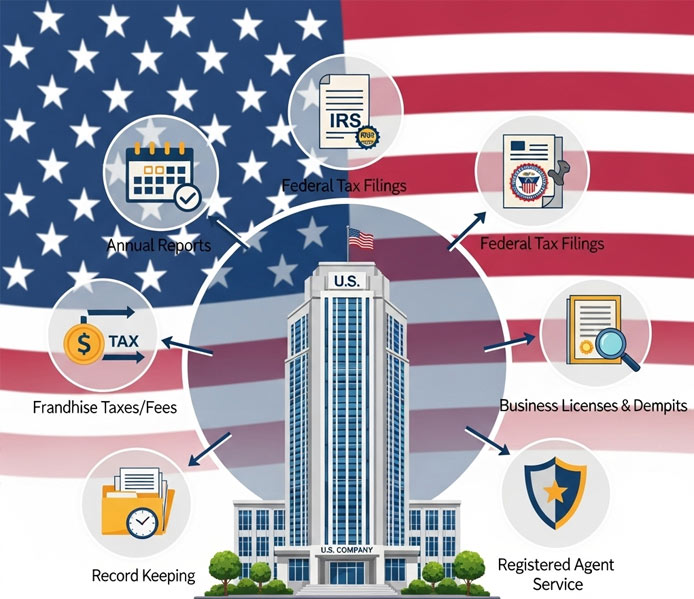
Entering the U.S. market unlocks access to one of the most dynamic and influential economies in the world. Whether you're launching a new venture or expanding an international footprint, forming a company in the United States provides a resilient legal structure, investor confidence, and direct access to a consumer base that values quality, innovation, and scalability.
From sole proprietorships and LLCs to corporations and partnerships, the U.S. offers a wide array of entity types to suit your operational needs. Choosing the right structure impacts your liability, taxation, and growth trajectory—and our expert guidance ensures your setup aligns perfectly with your strategic objectives. A U.S.-based company isn’t just an operational base—it’s a symbol of credibility and opportunity in the global business arena. With our end-to-end support, you can navigate the complexities of incorporation and launch your business with confidence, clarity, and a strategic edge.
A significant advantage of establishing a business in the U.S. lies in its sophisticated and transparent legal system, which is grounded in common law. This legal infrastructure provides predictability, enforceability of contracts, and strong protection for intellectual property rights—critical elements for fostering innovation and securing competitive advantage. Entrepreneurs and investors benefit from a clear regulatory environment that supports corporate governance, dispute resolution, and investor confidence.
Moreover, the U.S. is a global leader in innovation and technological development. Home to Silicon Valley and other advanced innovation ecosystems, it fosters collaboration between academia, private industry, and venture capital. This dynamic has cultivated a culture of entrepreneurship and rapid growth, attracting top-tier talent and investment from every corner of the world.

Gain direct entry to one of the world's largest and most affluent consumer markets, offering immense growth potential for your products and services.
Operating a business in the U.S. significantly elevates your company's international standing, fostering trust and opening doors to global partnerships.
Benefit from a well-established and predictable legal system that provides strong protection for businesses, intellectual property, and investors.
Be at the forefront of innovation with access to cutting-edge technology, research, and a vibrant ecosystem of startups and tech giants.
Tap into a vast network of venture capital, angel investors, and robust financial markets, providing ample opportunities for business funding and expansion.
Choose from a variety of legal structures like LLCs, C-Corps, and S-Corps, allowing you to tailor your business setup to your specific needs and tax strategies.
Choosing the United States for your business offers distinct advantages for growth and global recognition.
Select the optimal legal structure for your business goals:
| Entity Type | Key Features | Best For |
|---|---|---|
| Limited Liability Company (LLC) | Flexible, limited liability, pass-through taxation (default), minimal formalities | Startups, small businesses, real estate, consultants |
| C Corporation (C-Corp) | Separate legal entity, corporate tax, shareholder liability limited, complex structure | Large businesses, seeking venture capital, public offerings, significant growth |
| S Corporation (S-Corp) | Pass-through taxation, limited liability, avoids double taxation (meets IRS criteria) | Small-to-medium businesses, owner-operated businesses, specific tax advantages |
| Sole Proprietorship | Simplest, no legal distinction between owner and business, unlimited liability | Individual entrepreneurs, freelancers, low-risk ventures, minimal startup costs |
| Partnership (General/Limited) | Two or more owners, shared profits/losses, varying liability based on type | Collaborative ventures, professional services (e.g., law firms, accounting firms) |
| Non-Profit Corporation | Formed for charitable, educational, or religious purposes, tax-exempt status possible | Organizations with social missions, charities, educational institutions |
| Benefit Corporation | For-profit entity with a social/environmental mission, legal protection for mission | Socially conscious businesses, impact investors, B Corps |

The U.S. legal framework for businesses is complex, operating on both federal and state levels. While federal laws govern areas like taxation, antitrust, and intellectual property, the formation and governance of business entities are primarily regulated by individual states. Each state has its own corporate statutes, which dictate the requirements for incorporation, ongoing compliance, and dissolution. This decentralized approach allows for flexibility, but also necessitates careful consideration of the chosen state for incorporation, as it can impact legal obligations, tax liabilities, and operational ease.
Common U.S. business structures include Limited Liability Companies (LLCs), C Corporations (C-Corps), and S Corporations (S-Corps). An LLC offers limited liability protection to its owners (members) while providing flexible taxation options, often treated as a pass-through entity. C-Corps are separate legal entities, subject to corporate income tax, and are ideal for businesses seeking significant investment or public listing. S-Corps are similar to C-Corps but elect to pass corporate income, losses, deductions, and credits through to their shareholders for federal tax purposes, avoiding double taxation. Understanding these distinctions and selecting the appropriate structure is crucial for long-term success and compliance.
Establishing your US company follows a clear and efficient step-by-step process
Begin by selecting the state for your company's incorporation, considering factors like business type, tax implications, and operational needs. Once a state is chosen, we will assist in performing a name availability search with the respective Secretary of State to ensure your desired company name is unique and compliant.
Every U.S. company must designate a registered agent with a physical street address in the state of formation. This agent receives official legal and tax documents. Concurrently, we will prepare and file the necessary formation documents, such as Articles of Organization (for LLCs) or Articles of Incorporation (for Corporations), with the state authority.
After state approval, we will assist in applying for an Employer Identification Number (EIN) from the IRS, which is crucial for tax purposes, opening bank accounts, and hiring employees. For LLCs, we'll help draft an Operating Agreement, and for Corporations, Bylaws, outlining internal governance and ownership.
Depending on your industry and location, various federal, state, and local business licenses and permits may be required. We will guide you through identifying and acquiring these necessary approvals, ensuring your company is fully compliant and ready to commence its operations in the United States.
To comply with U.S. regulations and financial institution requirements, specific documentation is needed for all individuals and corporate entities involved in U.S. company formation. This ensures transparency and legal adherence.
We will provide detailed guidance on the exact requirements and assist with the proper certification and submission of all necessary documentation to ensure a seamless process.
Maintaining a company in the United States involves adherence to various federal and state-level compliance requirements. These obligations ensure your business remains in good standing and avoids penalties. Key ongoing responsibilities include:
Annual Reports/Statements: Most states require annual or biennial reports to be filed with the Secretary of State, updating company information. State Franchise Taxes/Fees: Many states impose annual franchise taxes or fees, regardless of income. Federal Tax Filings: Companies must file federal income tax returns with the IRS (e.g., Form 1120 for C-Corps, Form 1065 for Partnerships, Form 1040 Schedule C for Sole Proprietorships, or Form 1120-S for S-Corps). Registered Agent Service: Continuously maintain a registered agent in your state of formation. Business Licenses and Permits: Renew any required federal, state, and local operational licenses and permits. Record Keeping: Maintain accurate financial records, meeting minutes, and other corporate documents. Our services can assist in managing these ongoing compliance needs, allowing you to focus on your core business operations.

We offer competitive and transparent pricing for United States company formation and ongoing services. Our packages are designed to provide comprehensive solutions tailored to various business needs.
Starting from
Starting from
Starting from
*Prices are indicative and may vary significantly by state and specific requirements. State filing fees are additional. Annual renewal fees apply for ongoing services. Please contact us for a personalized quote.
Our team of experts is ready to assist you. Please fill out the form below with your details and specific needs, and we will contact you promptly to discuss how we can help achieve your global business objectives.
An LLC (Limited Liability Company) offers limited liability protection to its owners (members) while providing flexible taxation options, often treated as a pass-through entity. A Corporation (C-Corp) is a separate legal entity, subject to corporate tax, and is better suited for raising significant capital and attracting investors.
Formation times vary by state and the type of entity. Typically, once all required documents are submitted and reviewed, the process can take anywhere from 1 to 3 weeks. Many states offer expedited processing for an additional fee if you need to establish your company more quickly.
While you don't necessarily need a physical office for your day-to-day operations, you are required to have a "registered agent" with a physical street address in the state where your company is formed. This agent is responsible for receiving official legal and tax documents on your company's behalf. A virtual office can provide a business mailing address, but it's separate from the registered agent requirement.
Ongoing compliance includes filing annual or biennial reports with the state's Secretary of State, paying state franchise taxes or fees (if applicable), and filing federal income tax returns with the IRS. Specific requirements vary based on your company's legal structure (LLC, C-Corp, S-Corp) and the state of formation. Maintaining a registered agent and renewing any necessary business licenses are also crucial.
Yes, absolutely. Non-U.S. citizens and non-residents can form and own companies in the United States. There are no citizenship or residency requirements for company ownership. However, you will need an Employer Identification Number (EIN) from the IRS for tax purposes, and you must appoint a registered agent with a physical address in the state of formation.
